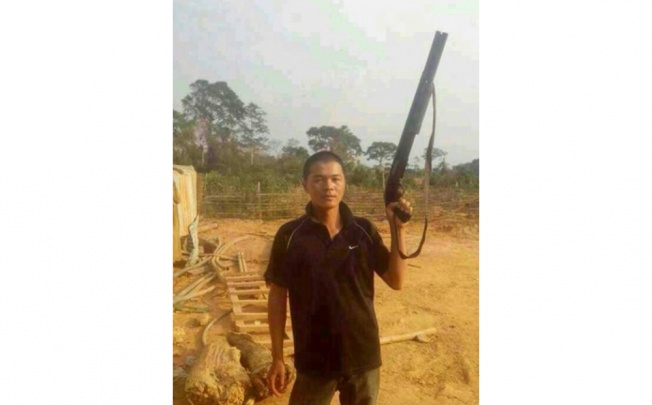Chinese flee Ghana gold crackdown
AFP-JIJI


DUNKWA-ON-OFFIN, GHANA – When he saw the trucks full of police and soldiers rumbling across the muddy field where he mines gold, Emmanuel Quainn ran. But they weren’t coming for him.
They were after his Chinese counterparts, who had turned up about a year ago to dig into the earth around the town of Dunkwa-on-Offin, central Ghana, in search of gold.
The business was lucrative. It was also illegal.
“Most of the Chinese people went very far from here, because when they get them they’re going to be under arrest,” said Quainn, who quit his job installing satellite dishes for the more reliable pay of small-scale gold mining.
In May, Ghana’s government sent a task force of soldiers, police and immigration officers into its gold mine heartland to root out foreigners who have flooded mining districts in recent years.
In a series of raids in June and July, the task force arrested at least 571 Chinese nationals and a total of 4,592 have left the country, Ghana Immigration Services spokesman Francis Palmdeti said last week.
Also arrested were citizens of Niger, Russia and Nigeria.
But in interviews, some who witnessed the raids accused Ghana’s security forces of heavy-handedness and indiscriminate arrests.
Liu Long Fei, a restaurant worker at a hotel in Dunkwa-on-Offin who was arrested and spent more than a week in custody, said soldiers carrying out a nighttime raid kicked in doors and arrested everyone who looked Chinese.
“It doesn’t matter if (the immigrants are) financial worker or (have) other job, they just come here and their duty is to catch the Chinese,” he said in broken English.
The raids created an awkward situation for China, which has been investing heavily in African nations in its search for new markets as well as oil and other natural resources. In Ghana, China has been awarded infrastructure projects and plans a $3 billion loan backed by the West African nation’s oil production.
Ghana is eager for Chinese money but says foreign-backed mining operations are ruining its heartland.
“It’s not about targeting any particular nationality,” said Palmdeti. “The task is to ensure that the degradation that is going on, in terms of our environment and waterways, is halted.”
Known as “the Gold Coast” during British colonial rule, mining remains a driving force in Ghana’s economy. The country of 25 million people is the second-largest gold producer in Africa, churning out 4.2 million ounces last year.
Along with its vibrant cocoa industry and nascent oil production, gold production helped grow Ghana’s economy by 7.9 percent last year.
Ghanaian laws allow citizens to mine small-scale plots up to about 10 hectares, but they ban foreigners from the practice, commonly known as “galamsey.”
Dunkwa-on-Offin has long been a mining town, local official Peter Kofi Owusu-Ashia said, but he has noticed changes in recent years.
Ghanaians began foregoing the hand tools they traditionally relied on in favor of excavators and other heavy equipment shipped in by Chinese businessmen, he said. It turned what was once small-scale artisanal mining into something much more destructive.
Many of the Chinese were from Shanglin county in Guangxi province, which also has a tradition of gold mining. By 2009, the people of Shanglin had heard there was money to be made in faraway Ghana, said Yang Jiao, a doctoral candidate at the University of Florida who is researching Chinese investment in Ghana.
The Chinese often worked with local brokers to assist their entry into the country and pay off local officials for land access, Jiao said.
“All these brokers and local elites, local chiefs . . . also have vested interests in this kind of illegal mining,” Yang said.
Isaac Abraham, a spokesman for the Ghana Minerals Commission, estimates there are more than 1,000 licensed small-scale mines, though many of them simply forgo paperwork.
As the Ghanaian countryside became pockmarked from the pits dug by miners and rivers began to turn to brown sludge, pressure mounted on newly elected President John Dramani Mahama.
In early June, soldiers in Dunkwa-on-Offin descended on the Takyiwa Memorial Paradise Hotel, a hangout for the town’s Chinese population. Liu said he was awakened late into the night by security forces pointing guns and torchlights at people still in bed.
“They are saying ‘Get up, get up,’ so rudely,” Liu said. “I told them, ‘I’m legal, I’m managing here, why did you spoil my door?’ “
Liu said the hotel was emptied out and anyone who looked Chinese was put on buses and sent to immigration headquarters in the capital, Accra. Security forces ignored those who tried to show visas and work permits, Liu said, and confiscated phones and money before throwing the arrested into packed jail cells.
Pan Yuan Hua, the manager of the hotel’s restaurant, showed what he said was a photo from a phone smuggled into the Chinese detainee’s prison cell. It showed people sleeping on top of each other on the overcrowded cell’s floor.
Palmdeti, the immigration spokesman, denied allegations of mistreatment. “We haven’t brutalized or used (force) on anybody,” he said.
Dunkwa-on-Offin’s Chinese miners are now mostly gone, but the excavators are still around, as is the know-how for finding gold in the deep, sun-scorched pits.
“We plan to continue mining. When they leave, we do it ourselves because we have learned most of their techniques,” Quainn said. “So it will be easier for us.”

No comments:
Post a Comment
Comments always welcome!